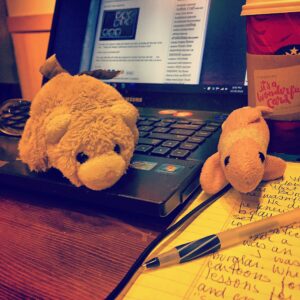Your character’s name is more important than you think.
Names can influence a reader’s approach to your story. What tone do you want to give your piece? What’s the setting? What’s the genre?
Interestingly, its all about the consonants. Looking at Grammarly’s definition, consonants are letters that block the mouth’s airflow. Hard letters like k, t, d, x and p affect the vocal tract while vowels (a, e, i, o and u) are smooth. Go ahead, try it right now. I know you want to.
Consider some genres. In a mystery, in romance In memoir, when you’re changing a name to protect the guilty, what feeling do you want associated with that person.
How do you find names?
1–Look at baby names.
BabyNames.com is a vast encyclopedia of names by letter, gender, month, trends, theme and astrological signs. According to the site, people who like the gender-neutral name “Icarus” also like “Diana,” both words that are of Greek and mythology origin.
2–Refer to a thesaurus.
Similar names to Diana, for example, include: Dianna, Dayanna, Danna, Deanna, Diane, Dana, and Leanna. The meaning of
Diana refers to the Roman goddess of the hunt and the moon, who is the counterpart of the Greek goddess, Artemis.
3– Consider the spelling, such as replacing the letter “i” with the letter “y”.
Diana becomes Dyana. Marianne = Maryanne. Brian = Bryan. Winston = Wynston. Chris becomes Chrys. Sometimes it works, and sometymes it doesn’t. What other letters you can switch around?
4–Look up city names.
A search of cities in New Jersey offers a myriad of choices that include: Elizabeth; Patterson; Tom (Tom’s River); Alan and Dale (Allandale); Barney (Barnegat); Marabelle (Bellmawr).
5–Combine initials of people around you.
In a fictional dragon story I’m working on, I needed a character who was part of a love triangle. Love. Marriage. I love my husband, Keith. My character’s name became Kadi: Keith (K) and (A) Diana (Di). Kadi. This has nothing to do with either of us being in a love triangle. In fact, it has more a connection love between us.
6–Spell a name backwards.
My college friend gave me a bit of brilliant advice: once you finish a story, switch the first and last sentences. You’d be surprised how that can change the feeling of a piece. That same approach can work in names. Not always, but when it does, it can be inspiring.
From my name, Diana, “Anaid” sounds like a healer to me.
“Htiek” does not work for my husband’s name because of the consonants. In this instance, rearranging the letters creates Hitek, Heith, Heath, Heather, and Hyacinth. “Hyacinth” is a plant, flower or gem. A search of the word “flower” brings up female names: Mae, Violet, Sunshine, Ruby, Della, Amelia and Faith. Male flower names include: Charles, Kingsley, Florentino, Antony, Perry and Nick,
Where do your names come from? Share in the comments below.

